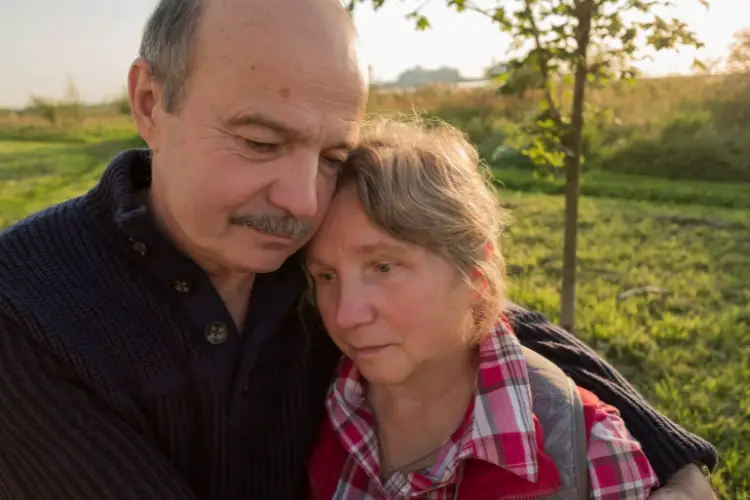Grief within a marriage is both a shared journey and a deeply individual experience that can strain even the strongest bonds. When loss enters a couple’s world, the foundations they’ve built their lives upon can suddenly feel shaken.
Each person experiences and processes grief differently, yet they must find a way to navigate this seismic life transition together.
While grieving is undoubtedly painful, it need not break a marriage. In fact, many couples emerge from this darkness with a bond that’s been tempered by fire – one marked by deeper empathy, vulnerability, and an ability to cherish each moment.
In this blog post guide, we will share tools for honoring each partner’s individual grieving process while reinforcing the connective tissue of the relationship through communication, compassion, and care.
Understanding the Dynamics of Grief in Marriage
1. Different Grieving Styles:
It’s completely normal (and expected) for partners to have contrasting styles of grieving. One partner may be more outwardly emotional, while another internalizes. Some find comfort in talking through their pain, while others need solitude.
These differences don’t signify a lack of love or commitment; they simply reflect how individually wired we are as humans to cope with trauma. However, divergent grieving styles can inadvertently create distance, misunderstandings, and even feelings of isolation if couples aren’t proactive about bridging this gap.
2. The Ripple Effects:
Grief is an all-encompassing force that can impact every corner of a couple’s life together. Clear and compassionate communication may become strained. Physical and emotional intimacy often take a hit as one or both partners struggle with sadness, anxiety, or detachment.
Even the most mundane aspects of a marriage – who handles which household tasks, how decisions get made – can be disrupted as each person’s bandwidth for “normal life” gets compressed by their inner turmoil.
Finances, parenting, and future plans can all get thrown into upheaval. The entire ecosystem of a relationship can be thrown off-kilter.
3. Guilt and Resentment:
In the midst of mourning a profound loss, it’s common for complex emotions like guilt and resentment to take root. If you’re the partner who seems to be coping better or grieving with less visible intensity, you may be plagued by guilt that you’re not feeling things “the right way.”
The partner who is outwardly struggling more may resent what they perceive as their spouse’s ability to “move on.” Both are natural reactions, but they can drive an emotional wedge between partners at a time when connection and understanding are most needed.

Tools for Couples to Cope Together
1. Communication is King:
We’ve all heard “communication is key” to the point that it borders on cliche. But when it comes to couples grieving together, it’s not an overstatement – it’s a vital life raft. However, communicating about loss requires special intention and effort:
- How to start these difficult conversations: Lead with vulnerability and an open-ended question like “How has grief been feeling for you lately?” Frame it as a desire to understand, not an invitation to problem-solve.
- Tips for active listening and validation, even if you don’t understand your partner’s process: Put your own thoughts on pause. Repeat back what you’re hearing to confirm understanding. Reassure your partner that their feelings and experiences are valid, even if they differ from your own.
- Setting aside dedicated time to share grief experiences: Find a recurring window (daily, weekly, etc.) to truly be present and focus solely on sharing your grieving journeys with one another. Continuing life’s routines and responsibilities alongside this grief-specific check-in can provide balance.
2. Patience and Space:
As much as you both want to be present for each other during this crisis, you may also need to grant one another grace to have personal seasons of solitude, reflection, or temporary emotional distance.
Pushing your partner to engage with their grief in a way that doesn’t feel authentic to them could do more harm than good. Have conversations about each other’s needs for time and space, and respect those boundaries.
3. Rituals and Remembrance:
Creating rituals to honor your loss as individuals and a couple can provide muchneeded solace and opportunities to feel truly seen by one another. Perhaps it’s a yearly memorial service, weekly grave visits, or daily readings of favorite poems or scripture.
Or maybe it’s as simple as lighting a candle at dinnertime to commemorate a lost loved one’s memory. These rituals needn’t be elaborate or traditional – the key is finding what feels right for you as a couple.
4. Maintaining Connection:
In the depths of grief, it’s easy for partners to lose touch with the core reasons they cherish one another and find joy in their union. It may seem frivolous or even impossible, but making concerted efforts to maintain a connection through shared activities, dedicated date nights, laughter, and physical intimacy is critical.
You needn’t put grief entirely aside – rather, let these connection points be a rejuvenating forest bath amidst the brambles of bereavement.

When to Seek Outside Support
1. Red Flags:
At some point, virtually all couples may benefit from enlisting reinforcements to help with the emotional heavyweights of grief. However, there are some specific indicators that outside intervention could be urgently needed to avoid irrevocable fractures:
- Constant conflict or communication breakdown
- One or both partners withdrawing entirely from the relationship
- Loss of emotional or physical intimacy that doesn’t seem to improve over time
- Self-destructive or worrying behavioral shifts in one partner
- Feelings of resentment or disdain toward each other festering without reprieve
If unaddressed, these declines can calcify into a bond that is beyond repair. It’s wise to get help sooner rather than later.
2. The Value of Therapy:
Many couples assume that therapy is solely for relationship crises or dysfunction. In reality, experienced counselors can be indispensable guides for couples facing major life stressors like grief. Therapists can mediate productive dialogues about complex emotions, power struggles, or conflicts in grieving styles.
They may introduce coping methods tailored to a couple’s dynamic, from emotion mapping to joint journaling exercises. Most critically, having an impartial third party can provide validation when one partner is feeling unseen or misunderstood by the other.
3. Support Groups & Resources:
While couple’s therapy offers focused assistance for just the two partners, connecting with a broader community of grievers can lend immense perspective and comfort. Both partners may find it cathartic to see that their individual experiences and struggles aren’t isolating or abnormal.
In-person and online support groups allow couples to witness others’ resilience in the face of loss. Grief podcasts, books, hotlines, and local organizations can point partners toward a multitude of resources they may not have known existed.

Beyond Survival – Finding Growth After Loss
1. Redefining Your Bond:
Grief changes people, full stop. And since marriage is an intertwining of two lives, those individual transformations invariably alter the shape of a couple’s union as well. Part of the journey beyond merely surviving grief to thriving again involves consciously redefining roles, routines, goals, and the very nature of how you relate to one another now.
It may involve excavating old dreams or forging entirely new ones built upon your shared hardships. The relationship you re-emerge with will be different, and that metamorphosis warrants being purposeful about how you renovate its foundations.
2. Post-traumatic Growth:
For all its devastation, loss and grief create openings for immense personal growth and relationship resilience that may have been inconceivable before. The very fact that you’ve endured such seismic pain together can engender a new appreciation for life’s fragility – as well as a resolute commitment to cherishing each moment you’re given.
You’ve been forced to confront fears, lean into vulnerability, and expand your emotional awareness in ways most take for granted. With intention, couples can harness those awakenings to cultivate richer lives of depth, authenticity, meaning, and inner strength.
3. Finding Meaning:
Hand-in-hand with post-traumatic growth often comes a driving need to derive meaning from unfathomable loss. Each partner may pursue this yearning differently: Through tangible legacy projects honoring loved ones, through professional or lifestyle pivots sparked by a new perspective, or simply by cherishing time together more fervently.
Whatever shape(s) it takes, helping each other intentionally explore how to locate pockets of purpose among the pain can gradually restory grief from an aimless abyss to a catalyst for profundity.
Conclusion
A Journey, Not a Destination: For all the wisdom and tools outlined here, understand that grief has no finite timeline or destination. Its roller coaster of advances and cascades will ebb and flow, with setbacks or fresh tsunamis of emotion constantly possible.
What’s important is that you’ve strengthened your grip on one another to withstand these storms with more resilience.
Stronger Together: Grief tests a couple’s commitment, compassion reserves, and determination like few other forces. Yet those who choose to face this crucible as partners – lending one another grace, devotion, and resolve – stand to emerge stronger, more connected, and more attuned to life’s bittersweet beauty. It is indeed an arduous journey, but one that can ultimately fortify a marriage’s bonds in ways solace could never replicate.

